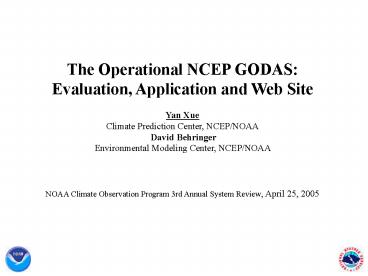The Operational NCEP GODAS: - PowerPoint PPT Presentation
1 / 36
Title:
The Operational NCEP GODAS:
Description:
Altimetry sea level. MODEL RUNS. GODAS. RA6. Simul (same as GODAS except ... Impacts of altimetry sea level on GODAS. Impacts of geostrophic adjustment on GODAS ... – PowerPoint PPT presentation
Number of Views:30
Avg rating:3.0/5.0
Title: The Operational NCEP GODAS:
1
The Operational NCEP GODAS Evaluation,
Application and Web Site Yan Xue Climate
Prediction Center, NCEP/NOAA David Behringer
Environmental Modeling Center, NCEP/NOAA
NOAA Climate Observation Program 3rd Annual
System Review, April 25, 2005
2
MODEL RUNS
- GODAS
- RA6
- Simul (same as GODAS except no data
assimilation)
VERIFICATION
- Dependent Data
- TAO temperature profiles
- World Ocean Atlas 2001 (WOA01)
- Independent Data
- Tide Gauge (sea level)
- Gregory Johnsons CTD (salinity)
- Peter Niilers drifter current (velocity)
- TAO ADCP (velocity)
- Altimetry sea level
3
Spurious Cooling Trend in GODAS
Surface Velocity in GODAS
4
Temp Diff GODAS RA6 at 105 meter
1980
Warm biases before 1990 ?
1990
2003
5
Simul(1979-1991) WOA01
Simul(1992-2003) WOA01
6
GODAS(1979-1991) WOA01
GODAS(1992-2003) WOA01
7
XBT data increases sharply in 1990
TAO data increases sharply in 1993
8
(No Transcript)
9
NCEPs CFS SST forecast Clim Diff
Lead 1 Month
Lead 6 Month
OI SST
10
Drifter Current
GODAS Current
11
Correlation
RMS Diff
of pentads
12
(No Transcript)
13
Summary
- Spurious cooling trend in GODAS is caused by the
warm biases in simulation that have not been
effectively corrected before 1990 when in situ
observations are sparse. - Large errors remain in midlatitude Southern
Hemisphere where more in situ observations are
needed. - Surface zonal velocity compares well with surface
drifter velocity except in the equatorial Pacific.
14
Applications of GODAS at NCEP
- CFS model uses GODAS as oceanic initial
conditions. - Weekly ENSO Update uses GODAS pentad
temperature and sea level fields to monitor
intraseasonal oceanic variability. - Climate Diagnostic Bulletin uses GODAS monthly
temperature and sea level fields to assess
interannual oceanic variability. - Markov model uses GODAS monthly sea level field
as predictor. - CCA ENSO model uses GODAS monthly sea level and
depth of 20 degree as predictors.
- Explore ocean indices for ENSO monitoring
- Study MJO-ENSO connection
- Study coupled ocean-atmospheric modes in the
Tropical Atlantic Ocean.
15
Ocean Indices for ENSO Monitoring
- Recharge and Discharge ENSO theory ---
- heat storage within 120OE-110OW and 4.5OS-4.5ON
- WWV
- warm water volume above depth of 20OC
- HC
- averaged temperature in the top 300 meter
- SL
- sea level
16
(No Transcript)
17
Lead NINO3.4
Lag NINO3.4
18
CPCs Weekly ENSO Update
Oceanic Kelvin Waves
19
MJO-related Oceanic Kelvin Waves and the ENSO
Cycle A Study with the NCEP Global Ocean Data
Assimilation System Kyong-Hwan Seo and Yan Xue,
accepted by GRL
EEOF 1
Depth of 20OC
EEOF 2
20
SVKW seasonal variance of Kelvin wave
NINO3.4
Heat Content averaged temperature in top 300
meter within equatorial belt
21
HC
HC tendency
NINO3.4 tendency
NINO3.4
22
(No Transcript)
23
GODAS Web Site in Plan
- NOAAs Office of Climate Observation sponsors
CPC to host a web site for GODAS - Objectives
- Monitor different aspects of oceanic climate
variability - Assess benefits of NOAAs extensive investment in
global ocean observing system - Disseminate GODAS products to a broad user
community - Involve research community in assessment and
improvement of GODAS
24
GODAS Web Site Design
- Pentad products (archive past 3 months)
- Model output (SST, subsurface temperature, heat
content, depth of 20OC, mixed layer depth, ocean
current, wind stress, total heat flux, total
fresh water flux) - Data distribution (XBT, TAO, ARGO)
- Model-data intercomparison
- Monthly products (archive 1979-current years )
- Model output
- Data distribution
- Model-data intercomparison
- Climatology
- Skill assessment
25
GODAS Climatology
- Because there is a warm bias in GODAS before
early 1990s, the base period is 1992-2003. - Pentad climatology
- Pentad mean over 1992-2003
- Take first three harmonics
- Monthly climatology
- Average monthly climatology from pentad
climatology
26
(No Transcript)
27
60OE
140OW
30OW
Zonal Velocity
10S
10S
10S
10N
10N
10N
30N
30N
30N
30S
30S
30S
Meridional Velocity
28
Mean Sea Surface Temperature
GODAS
GODAS-WOA2001
29
Mean Sea Surface Salinity
GODAS
GODAS-WOA2001
30
(No Transcript)
31
Future Works
- Web site for GODAS
- Impacts of boundary forcing errors on GODAS
- Momentum fluxes AMIP, CDAS2, ERA40 and FSU
- E-P fluxes AMIP, CDAS2, CMAP and GPCP Prec.
- Impacts of altimetry sea level on GODAS
- Impacts of geostrophic adjustment on GODAS
- Applications of GODAS
32
(No Transcript)
33
SIM
RA6
GODAS
34
(No Transcript)
35
from 1992-2000 mean
36
Correlation
RMS Diff
of pentads

